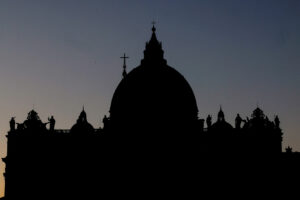VATICAN CITY — The Vatican said on Monday in a landmark ruling approved by Pope Francis that Roman Catholic priests can administer blessings to same-sex couples as long as they are not part of regular Church rituals or liturgies.
A document from the Vatican’s doctrinal office, which effectively reversed a declaration the same body had issued in 2021, said such blessings would not legitimize irregular situations but be a sign that God welcomes all.
It should in no way be confused with the sacrament of heterosexual marriage, it added.
It said priests should decide on a case-by-case basis and “should not prevent or prohibit the Church’s closeness to people in every situation in which they might seek God’s help through a simple blessing.”
The pope hinted that an official change was in the works in October in response to questions put forward by five conservative cardinals at the start of a synod of bishops at the Vatican.
While the response in October was more nuanced, Monday’s eight-page document, whose subtitle is “On the Pastoral Meaning of Blessings,” spelled out specific situations. An 11-point section was titled “Blessings of Couples in Irregular Situations and of Couples of the Same sex.”
The Church teaches that same-sex attraction is not sinful but homosexual acts are. Since his election in 2013, Pope Francis has tried to make the more than 1.35-billion-member Church more welcoming to LGBT people without changing moral doctrine.
Father James Martin, a prominent American Jesuit priest who ministers to the LGBT community, called the document “a major step forward in the church’s ministry” to them.
In a post on X, formerly known as Twitter, Mr. Martin said the document “recognizes the deep desire in many Catholic same-sex couples for God’s presence in their loving relationships,” adding that “along with many priests, I will now be delighted to bless my friends in same-sex unions.”
Francis DeBernardo, executive director of New Ways Ministry, a group that advocates for LGBT rights in the Church, said the document’s importance “cannot be overstated.” He praised the document’s wording that people seeking blessings should not be subjected to “an exhaustive moral analysis.”
Martin Hardwick and Andrew Gibb of Manchester, England, who are married and have been together 41 years, said the move was long overdue.
“You know if Jesus said love was love, then love is love, isn’t it?” Mr. Hardwick said.
“It’s about time,” Mr. Gibb added.
‘AN INVITATION TO SCHISM’
Monday’s ruling is bound to be opposed by conservatives, who already criticised the pope when he made his initial comments on the subject in October.
Ulrich L. Lehner, a professor of theology at the University of Notre Dame in the United States, said the new guidance from the doctrinal office “invites misunderstanding and will sow confusion.”
Voicing concern that some bishops would use it as a pretext to do what is explicitly forbidden, the professor added, “it is, and I hate to say it, an invitation to schism.”
The document, whose Latin title is Fiducia Supplicans (Supplicating Trust), said the form of the blessing “should not be fixed ritually by ecclesial authorities to avoid producing confusion with the blessing proper to the Sacrament of Marriage.”
It said it can be applied to those who “do not claim a legitimation of their own status, but who beg that all that is true, good, and humanly valid in their lives and their relationships be enriched, healed, and elevated by the presence of the Holy Spirit.”
“Ultimately, a blessing offers people a means to increase their trust in God,” it said, adding that it “must be nurtured, not hindered.”
The document said the blessing should not be linked to or timed with a civil marriage ceremony and be performed with none of the “clothing, gestures, or words that are proper to a wedding.”
Places for such blessings, it said, might be “in other contexts, such as a visit to a shrine, a meeting with a priest, a prayer recited in a group, or during a pilgrimage.”
The ruling was signed by Cardinal Victor Manuel Fernandez, the head of the head of the Vatican’s Dicastery for the Doctrine of the Faith and approved by the pope in a private audience with Cardinal Fernandez and another doctrinal office official on Monday. — Reuters

